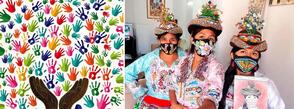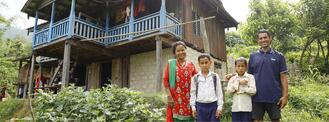 PHOTO: Illustration of hands (left): ©UNESCO Almaty. Photo (right): ©UNESCO/Venuca Evanan, Violeta Quispe and Gaudencia Yupari. PHOTO: Illustration of hands (left): ©UNESCO Almaty. Photo (right): ©UNESCO/Venuca Evanan, Violeta Quispe and Gaudencia Yupari. Bahá'í Perspective on Spiritual Aspects of Cultural Diversity and Sustainable Development: Attempt is to encourage a discourse on the spiritual value of cultural diversity and how such It will be suggested that the fundamental principle that underpins the maturation of sustainable development policy is a spiritually and materially integrated understanding of the value of humans, their cultures and the environment in which they live. …every Faith has given rise to a culture which flowered in different forms… The fundamental principle of the oneness of mankind, and the aim of the Faith to promote unity in diversity, underlie the Bahá'í approach to indigenous peoples. Their rights are inseparable from human rights for all, and the Bahá'í Faith upholds the right of indigenous peoples to develop and take pride in their own identity, culture and language.  The United Nations Interim Force In Lebanon (UNIFIL) commemorates the International Day of Peace by releasing doves, a symbol of peace. PHOTO:UN Photo/Pasqual Gorriz The United Nations Interim Force In Lebanon (UNIFIL) commemorates the International Day of Peace by releasing doves, a symbol of peace. PHOTO:UN Photo/Pasqual Gorriz The Baha'i Faith offers humanity a plan to bring about not only an end to war, but a lasting global peace. Isn’t that, after all, what a religion is supposed to do? The central purpose of the divine religions is the establishment of peace and unity among mankind. Their reality is one; therefore, their accomplishment is one and universal—whether it be through the essential or material ordinances of God. There is but one light of the material sun, one ocean, one rain, one atmosphere. Similarly, in the spiritual world there is one divine reality forming the center and altruistic basis for peace and reconciliation among various and conflicting nations and peoples. - Abdu'l-Baha, The Promulgation of Universal Peace, p. 98.  A Nepalese family in front of their house. With support from a Joint UN Programme, the family increased its income by converting field from grain production to high-value vegetables. PHOTO:UN Women/Narendra Shrestha A Nepalese family in front of their house. With support from a Joint UN Programme, the family increased its income by converting field from grain production to high-value vegetables. PHOTO:UN Women/Narendra Shrestha A Baha'i Perspective The Family As The First Community. Though most societies and cultures recognize the family as a necessary and fundamental unit, many changes are occurring to threaten its well-being and the happiness of its members. The family is a microcosm of the world, and its unity must be preserved if the unity and peace of our planet is to be realized. The Baha'i Writings place great emphasis on the nobility of human beings and the importance of each person acquiring the highest qualities in order to serve his or her best interest, as well as those of humanity. Therefore in Baha'i communities worldwide, new teachings and principles bearing on the equality of men and women, the true and ultimate purpose of marriage and of family life, the relationship of members of the family to each other and to society at large, and the education of children have been accepted and are being implemented.
4/5/2021
3 May- World Press Freedom Day Journalists in the line of duty. PHOTO:left - UNESCO/©Thomas Hawk; right - UN Photo/Evan Schneider. Journalists in the line of duty. PHOTO:left - UNESCO/©Thomas Hawk; right - UN Photo/Evan Schneider. Baha’is exalt and honor the profession of journalism. Abdu’l-Baha, interviewed by Western journalists many times, said “We may ascertain the progress or retrogression of a nation by its journalism,” and “Journalists must write significant articles, articles that shall foster the public welfare. If they do so they will be the first agents for the development of the community.” |
Bahá’ís of BotswanaBahá’í communities are working together with their neighbours and friends to promote and contribute to the well-being and progress of society. In urban centres and rural villages, in homes and schools, citizens of all backgrounds, classes and ages are participating in a dynamic pattern of life, taking part in activities which are, at once, spiritual, social and educational. Archives
January 2023
Categories |
FOR MORE INFORMATION
|
|
 RSS Feed
RSS Feed